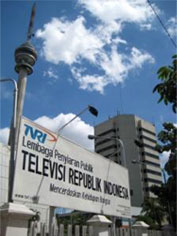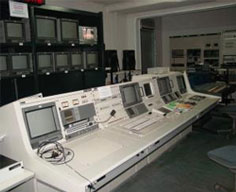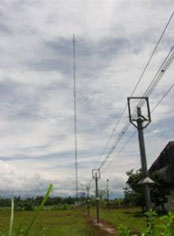
| ENGLISH |  |
BAHASA INDONESIA |  |
日本語 |
|
Outline of Japan's ODA Activity in Indonesia in Individual Sectors
 Information and Communication Information and Communication
Japanese assistance supports broadcasting – contributing to national unification and democracy The development of radio and TV broadcasting has played an important role for national unification and democracy of the Republic of Indonesia which is the largest archipelago country in the world, made up of many different ethnic groups. This is symbolized the fact that Radio Republik Indonesia, or RRI, Indonesia’s public radio broadcasting company, was established and started broadcasting immediately after independence in August 1945, and that the broadcast of the commemoration ceremony of the 17th anniversary of the independence of Indonesia on August 17, 1962 was the first live broadcast by Televisi Republik Indonesia, or TVRI in Indonesia. In the process of the development of Indonesian radio and TV broadcasting, Japanese assistance contributed a great deal. With regard to radio broadcasting, Japan’s assistance to Indonesia dates back to the period during World War II when Nippon Hoso Kyokai, the former organization of NHK, sent young engineers and program producers. After 1976, Japan provided a series of assistance for the establishment of medium wave radio stations, renewal of old facilities and the opening series establishment of FM radio stations. It also assisted in training engineers. At present, Indonesia has 58 radio broadcasting stations throughout the country with more than 90 percent of the whole population having access to news and entertainment programs by radio. With regard to TV broadcasting, Japan assisted Indonesia in expanding TV broadcasting networks throughout the country through establishment of many TV stations (construction of TV studios and transmitting stations). Furthermore, through JICA, Japan has provided assistance from 1963 to 2006, with temporary interruption, for program production, broadcasting and technical management and so on. Today, TV broadcasting covers 64 percent of Indonesia geographically and 82 percent of the total population, enabling many people to enjoy news and entertainment programs through television.
Furthermore, besides construction of the radio and TV broadcasting networks, the Japanese Government provided assistance to the establishment and management of the multimedia training center (MMTC: Yogyakarta) in order to train people who work at broadcasting stations. MMTC provides four years of educational training to those who want to work in broadcasting stations. It also offers a short-term practical training course for those who already work at broadcasting stations. MMTC is the only training facility which provides a wide range of training programs in Indonesia. The basics of producing TV programs to the application of broadcasting technology MMTC has equipment actually used at broadcasting stations. It plays a centred role in the human resource development in the area of broadcasting in Indonesia. MMTC has so far trained more than 2,700 graduates who are working actively in both public and private TV and radio broadcasting stations. The Japanese Government also provides “international training on TV program production” for those involved in broadcasting in the neighboring countries of the Asian and Pacific region, using the results of its cooperation and technological transfer at MMTC. Those involved in TV broadcasting in the neighboring countries are invited and then divided into groups to make a TV program on a given theme. Although the training is short, it enables the participants to experience the process of TV program production from planning, scenario writing, recording, to editing and so forth. Through these activities, MMTC serves as an important training facility on broadcasting not only for Indonesia but also for the Asia Pacific region.
"From Training at the Multi-Media Training Center to MetroTV"
Japan’s Assistance to Indonesia in the field of telecommunication Improvement of telecommunication (telephone) network has played an important role in the national development (regional development) of the Republic of Indonesia, which is the world’s largest archipelago country with many different ethnic groups. For many years in Indonesia, the Government has monopolized telecommunication sector through PERUMTEL (The National Telephone Corporation). However, due to the vast size of the country and the limited implementation capacity of PERUMTEL, network expansion has been slow. Even in 1998, the number of telephone density per 100 persons amounted to 0.47, which was the lowest among the ASEAN countries. After 1989, Indonesia started to expand the telephone network using funds and technology of private companies, including foreign companies. In 1991, PERUMTEL was privatized and became PT. TELKOM. As a result, telecommunication services were diversified responding to the current trend of the times, technical development and the needs of the users. Although a gap between big cities and provincial cities still remained, various telecommunication services became available countrywide, not only fixed telephones but mobile telephones, internet, etc. 2005 statistics show the number of telephone density per 100 persons reached 5.7 while that of mobile phones reached 21.1, contributing a great deal to the development of the Indonesian economy. Telecommunication has now become an indispensable part of daily life and social and economic activities in Indonesia. Japan has provided assistance to Indonesia for expanding the telephone network in provincial cities, sparsely populated areas and Jakarta, from the times when telecommunication was still a government monopoly. At the same time, Japan has also provided support to Indonesian Government so that its telephone network development and expansion plan can be implemented systematically and efficiently through assistance relating to standardization of construction codes and telephone line construction, training construction managers, establishing maintenance center for facility maintenance, and human resource development. As a result, approximately fifty percent of the total extension of Indonesia’s telecommunication network has been constructed with Japanese assistance.
|
|
||||||||||||||||||||||||||||||||

 Studio equipment of TVRI Makassar broadcasting station (Japanese aid)
Studio equipment of TVRI Makassar broadcasting station (Japanese aid)
 RRI Jakarta central broadcasting station
RRI Jakarta central broadcasting station






 Return Top
Return Top

